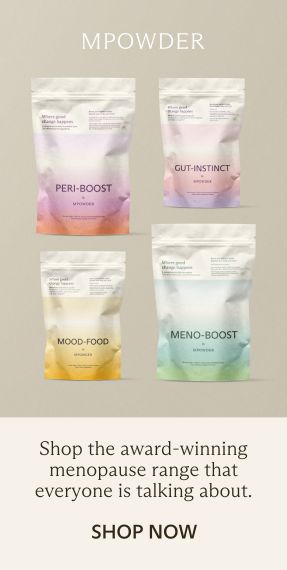MPOWDER is more than a product range - we’re a community committed to sharing insights, our own proprietary research and the stories you so generously share with us every day too. Which is why I try to say yes, whenever I can, do invitations to talk about midlife. My goal is simple; to reframe this lifestage as a stepping up point not a fading away. And to do that, not by pretending it’s all unicorns and rainbows (my own personal story behind the founding of MPOWDER is testament to that), but by sharing the facts. My goal is simple: to reframe midlife as a stepping up point, not a fading away.
And to do that not by pretending it’s all rainbows (my own story behind founding MPOWDER is testament to that), but by sharing the facts. Because here’s the truth: female biochemistry is phenomenal. And the symptoms you may be navigating? They’re not failures. They’re intelligent signals — triggered by your orchestra of hormones, asking you to tune in.
Here’s what we all need to know:
1. Mood swings and anxiety are neurological adaptation in action
Oestrogen and progesterone don’t just govern reproduction. They shape how we relate to the world — modulating serotonin, dopamine, and GABA, the brain chemicals that regulate calm, motivation, and emotional resilience. Oestrogen also influences social bonding and caregiving behaviour, priming us to nurture others, often at the expense of our own needs.
As these hormone levels shift, the brain begins to recode how it processes stress, connection, and identity. Mood swings aren’t just biochemical — they’re emotional recalibrations. For many women, this transition becomes a catalyst for redefining boundaries and reclaiming space for themselves.
Why it deserves awe: This isn’t emotional instability. It’s your brain and body adapting to a new chapter — neurologically and psychologically. A signal not just to soothe, but to listen.
What research suggests may help:
Research shows HRT to be particularly effective when addressing mood disruptions. Speak to your doctor. And if you don’t feel heard, find another one that will really listen to you.
- Magnesium to calm the nervous system
- KSM-66® Ashwagandha and Lemon Balm to reduce cortisol and resilience to stress.
- B vitamins, especially B6 and B12, for nervous system resilience
- Support from MPOWDER: Did you know MPOWDER MOOD-FOOD has just won ‘Best Menopause Supplement 2025’ from Good Housekeeping Institute? Learn more HERE
2. Midlife weight gain is a biochemical backup plan
As oestrogen levels fall, the body often stores more visceral fat around the abdomen — not because it’s giving up, but because that fat can convert into oestrone, a gentler form of oestrogen. This is your body’s way of self-regulating — maintaining a hormonal safety net when the ovaries step back.
Why it deserves awe:
This is improvisation. Your body is building a backup system — quietly, efficiently, to protect you.
What research suggests may help:
- Ahiflower® Oil (in MENO-BOOST), which supports inflammatory balance and metabolic function
- Chromium, Magnesium and Zinc to support glucose and hormone regulation
- Demulcents like Slippery Elm and Marshmallow Root (in GUT-INSTINCT) to ease digestive inflammation often linked to weight retention
- HRT may also play a role in supporting metabolic function and insulin sensitivity too.
-
Support from MPOWDER: GUT-INSTINCT AND MENO-BOOST harness these beautiful botanicals, blended synergistically, with a whole lot more too..
3. Brain fog is your brain redirecting energy — and preparing for longevity
During menopause, the brain undergoes significant changes as it adapts to fluctuating hormone levels. Studies have shown that while there may be temporary declines in glucose metabolism and gray matter volume in regions associated with memory and attention, these changes are often transient. Over time, the brain demonstrates a remarkable ability to recover and even enhance its structure and function.
In her book The Menopause Manifesto, Dr. Jen Gunter writes:
“I like to think of menopause as loading a new operating system. There may be a few glitches at first, but ultimately, it's an upgrade.”
Why it deserves awe:
This period is not indicative of cognitive decline but rather a sophisticated recalibration. The brain is reorganizing and strengthening neural pathways to support long-term cognitive health.
What research suggests may help:
- Bacopa Monnieri (found in MOOD-FOOD) has been traditionally used to support memory and cognitive function.
- Vitamin D, Zinc, and B Vitamins are essential for neuroprotection and maintaining cognitive performance.
- Adaptogens like ashwagandha can help mitigate the effects of stress on cognitive health.
- Hormone Replacement Therapy (HRT) may offer more than symptom relief — it is increasingly being recognised for its potential neuroprotective benefits. Emerging research suggests that when started within the “window of opportunity” (typically within 10 years of menopause onset or before the age of 60), HRT may help preserve cognitive function and even reduce the long-term risk of neurodegenerative diseases like Alzheimer’s.
Final Thought
Symptoms are not something to suppress or shame. They are certainly not something to ignore. They are an opportunity to listen in. And treat ourselves with care.
And when we do — with the right support, from whole foods and functional botanicals to medical interventions like HRT — we unlock the possibility not just of symptom relief, but of thriving.
This is the moment we’ve been waiting for.
Let’s treat it — and ourselves — with awe.
Share Twitter Facebook Pinterest

